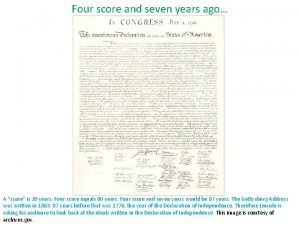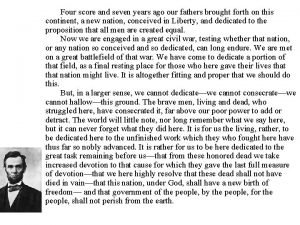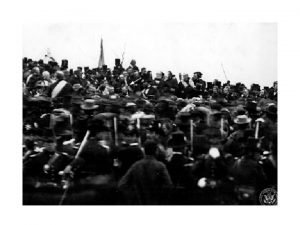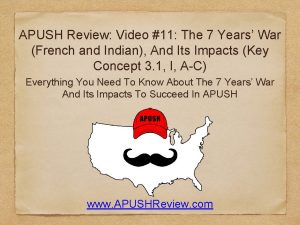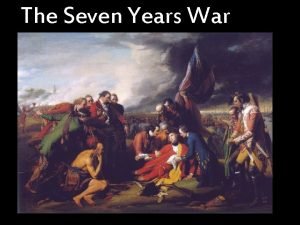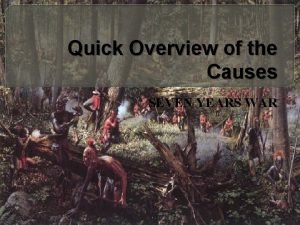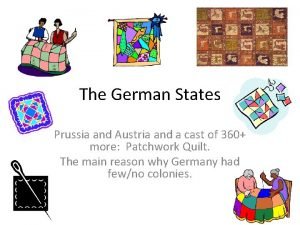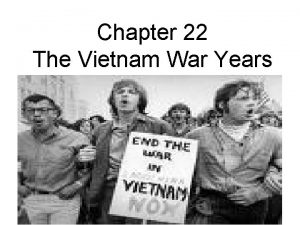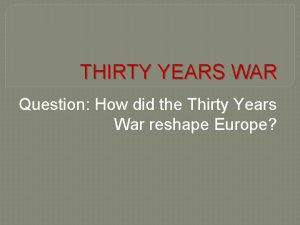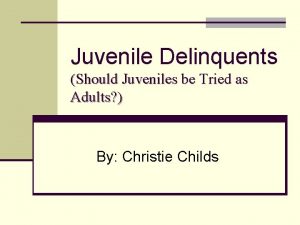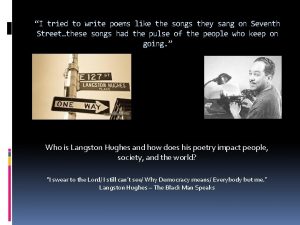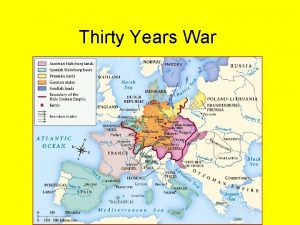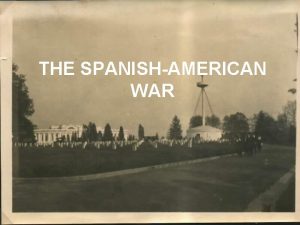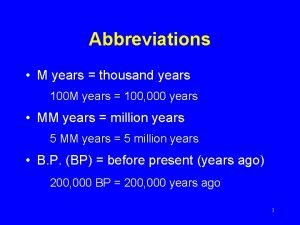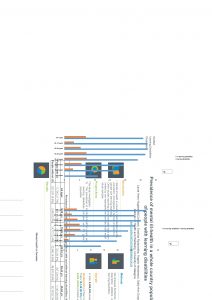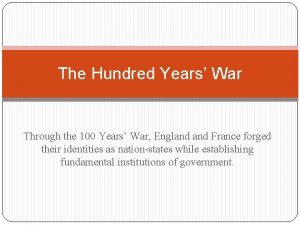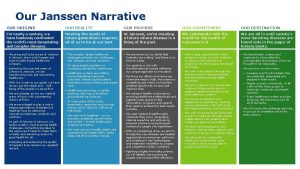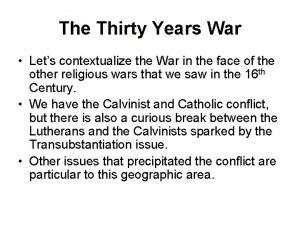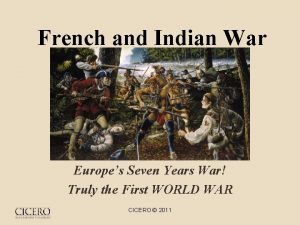Do Now The years of war tried our

























- Slides: 25

Do Now • ‘The years of war tried our devotion to the Union; the time of peace may test the sincerity of our faith in democracy. ’ – Herman Melville, 1866

The Goals of Reconstruction-How to Win the War and the Peace Mr. Winchell APUSH Period 5

Political Spectrum of Reconstruction Radicals Moderates Federal Supremacy Black Civil Rights Military Occupation Unionists Redeemers States’ Rights Blacks as Second-Class Citizens Home Rule KKK

Key Concepts • 5. 3. II: Reconstruction and the Civil War ended slavery, altered relationships between the states and the federal government, and led to debates over new definitions of citizenship, particularly regarding the rights of African Americans, women, and other minorities.

AP Prompt • Evaluate the extent the Civil War impacted the political, social, and economic landscape of the United States? • Evaluate the extent to which Reconstruction maintained continuity and fostered change in American politics and society?

Textual Analysis-Reconstruction • Southern Defiance vs. Freedmen Convention

3 Phases of Reconstruction • Presidential Reconstruction (1863 -1866) • Congressional (or Radical) Reconstruction (1867 -1877) • Redemption (1877 -1900)

President Lincoln’s Plan Ten Percent Plan • Proclamation of Amnesty and Reconstruction (1863) • Full presidential pardons to southerners who: – Took an oath of allegiance to the Union and the Constitution – Accepted the emancipation of slaves • State governments could be reestablished as soon as 10% of the population took the oath

Wade-Davis Bill (Radical Republican Plan) • Required 50% of the number of 1860 voters to take an “iron clad” oath of allegiance • Required a state constitutional convention before the election of state officials • Enacted specific safeguards of freedmen’s liberties • Based on two ideas: – “State Suicide” Theory [MA Senator Charles Sumner] – “Conquered Provinces” Position [PA Congressman Thaddeus Stevens] • Lincoln vetoed this bill, Congress enacted a similar version of it later.

Reconstruction, Phase 1 Lincoln’s Plan • Proclamation of Amnesty and Reconstruction (1863) – Full presidential pardons for • 1. Oath of allegiance, • 2. Accept end of slavery – Ten Percent Plan • Confederate state reestablished once 10% of voters affirmed allegiance and loyalty • • • Wade-Davis Bill (1864) Second Inaugural Address – “with malice toward none; with charity for all” Lincoln’s Assassination – April 14, 1865

Freedmen’s Bureau • Bureau of Refugees, Freedmen, and Abandoned Lands in March 1865 • Food, shelter, medicine for freed blacks and displaced whites • Education of blacks and colleges • Viciously attacked and ridiculed by Northern racists and bitter Southerners

Andrew Johnson (D) (1865 -1869) • Politics – War Democrat – Defender of Poor Whites • Resented planter class – White supremacist • Major Issues – Reconstruction – Impeachment

Reconstruction, Phase 2 Andrew Johnson’s Plan • Reconstruction Plan – Pardons for loyalty oath – No pardons for Confederate leaders who owned $20, 000 taxable property – Admitted Confederate states with appointed governors who established voting procedures for state legislatures – States must abolish slavery and secession clauses from state constitutions • Effects – Former confederates elected to office – Black codes enacted • Vetoes – Civil Rights Act of 1866 – Freedmen’s Bureau extension

Awkward Collision on the Grand Trunk Columbia R. R. November, 1866

The Radical Republicans • Radicals – Thaddeus Stevens – Charles Sumner • Midterm Election of 1866 – “Not every Democrat was a rebel, but every rebel was a Democrat!” – Won supermajorities in both houses of Congress Anti-Radical Republican propaganda Pennsylvania, 1866

Reconstruction, Phase 3 Radical Republican Plan • Reconstruction Acts of 1867 – – • Military districts New state constitutions approved by Congress Black suffrage guarantees Ratification of the 14 th Amendment Fourteenth Amendment (1868) – Anyone born or naturalized was American citizen (Citizenship Clause) – “nor shall any State deprive any person of life, liberty, or property, without due process of law” (Due Process Clause) – “nor deny to any person within its jurisdiction the equal protection of the laws” (Equal Protection Clause) – Disavowed Confederate leaders; states responsible for own war debt; loss of electoral votes for disenfranchisement • • Impeachment of Andrew Johnson (1868) Fifteenth Amendment (1869) – Right to vote for blacks



The South Is a Separate, Conquered Nation; The South Is Not a Separate, Conquered Nation Report of the Joint Committee on Reconstruction (1866) Andrew Johnson, State of the Union Address (1867) • • It must not be forgotten that the people of these States, without justification or excuse, rose in insurrection against the United States. They deliberately abolished their State governments so far as the same connected them politically with the Union as members thereof under the Constitution. They deliberately renounced their allegiance to the Federal government, and proceeded to establish an independent government for themselves…Finally they opened hostilities, and levied war against the Government. They continued this war four years with the most determined and malignant spirit, killing in battle and otherwise large numbers of loyal citizens on the sea and on the land, and entailing on the Government an enormous debt, incurred to sustain its rightful authority. Whether legally and constitutionally or not, they did, in fact, withdraw from the Union and made themselves subjects of another government of their own creation. . . The question before Congress is, then, whether conquered enemies have the right, and shall be permitted at their own pleasure and on their own terms, to participate in making laws for theur conquerors. . . The conclusion of your committee therefore is, that the so-called Confederate States are not present entitled to representation in Congress of the United States; that, before allowing such representation, adequate security for future peace and safety should be required; that this can only be found in such changes of the organic law as shall determine the civil rights and privileges of all citizens in all parts of the Republic. . . It is clear to my apprehension that the States lately in rebellion are still members of the National Union. When did they cease to be so? The “ordinances of secession” adopted by a portion of their citizens were mere nullities. If we admit now that they were valid and effectual for the purpose intended by their authors, we sweep from under our feet the while ground upon which we justified the war. Were those States afterwards expelled from the Union by the war? The direct contrary was averred by this Government to be its purpose, and was so understood by all those who gave their blood and treasure to aid in its prosecution. It can not be that a successful war, waged for the preservation of the Union, had the legal effect of dissolving it… This is so plain that it has been acknowledged by all branches of the Federal Government. The Executive (my predecessor as well as myself) and the heads of all the Departments have uniformly acted upon the principle that the Union is not only undissolved, but indissoluble. . . Indiscriminate vengeance upon classes, sects, and parties, or upon whole communities, for offenses committed by a portion of them against the governments to which they owed obedience was common in barbarous ages of the world. . . The punitive justice of this age, and especially of this country, does not consist in stripping whole States of their liberties and reducing all their people, without distinction, to the condition of slavery.

Freedmen in the South • Political Recognition – Voting Rights – Affiliated with Republican Party – Public Office • • • 2 U. S. Senators 14 U. S. Representatives 630 black state legislators Black governor of Louisiana Desire for Autonomy and Opportunity – Independent churches – Public schools • Slavery By Another Name – Sharecropping – Convict leasing

White Southern Resistance • White Supremacy Paramilitary Groups – The South Will Rise Again! – White League – Ku Klux Klan (1867) Nathaniel Bedford Forrest • “invisible empire” • – Enforcement Acts (1870, 1871) “The Union as it Was” Thomas Nast, Harper’s Weekly October 1874

Black Codes of Mississippi

Sharecropping • • 50% white farmers and 75% black farmers Crop-lien system Tenant farming Exodusters

Northern Influence on the South • Scalawags – Southern Republicans fostering American Systemtype programs – Cooperated with Northern politics and economics • Carpetbaggers – Northerners investing in “New South, ” – Reformers/provide aid – Squatters and plunderers The Man with the (Carpet) Bags Thomas Nast, 1872 Depicts Carl Schurz, a Liberal Republican critical of Grant’s Reconstruction policies

 Goat years to human years
Goat years to human years 300 solar years to lunar years
300 solar years to lunar years How long is “four score and seven years”?
How long is “four score and seven years”? Now i see it now you don't
Now i see it now you don't Four score and seven years
Four score and seven years How long is four score and seven years
How long is four score and seven years Metacoms war
Metacoms war 1453-1337
1453-1337 What caused the seven years war
What caused the seven years war Causes of the seven years war
Causes of the seven years war Seven years war
Seven years war Thirty years' war causes
Thirty years' war causes The domino theory vietnam war
The domino theory vietnam war Consequences of the 100 years war
Consequences of the 100 years war 30 years war phases
30 years war phases Spanish armada and thirty years war similarities
Spanish armada and thirty years war similarities Thirty years' war causes
Thirty years' war causes Causes of seven years war
Causes of seven years war Why shouldn't juveniles be tried as adults
Why shouldn't juveniles be tried as adults I tried poems
I tried poems The old man tried to stop
The old man tried to stop Pune, india, has tried to increase its rainfall by
Pune, india, has tried to increase its rainfall by Played tried smiled wanted
Played tried smiled wanted One basic question psychologists have tried to answer is
One basic question psychologists have tried to answer is Ever tried ever failed no matter
Ever tried ever failed no matter Jamie tried to solve an equation step by step.
Jamie tried to solve an equation step by step.


